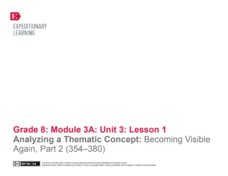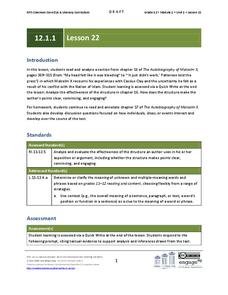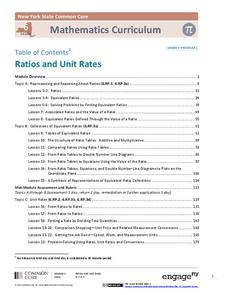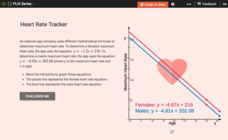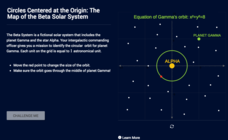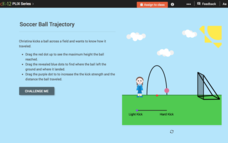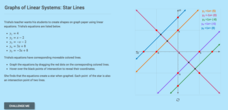Newseum
Civil Rights: Turning Points
As part of a civil rights movement study, groups select an event from an interactive timeline that they feel marks a turning point in the struggle. After collecting evidence to support their choice, the teams develop a multimedia...
Newseum
Before and After: Analyzing Turning Points in History
Scholars examine front-page news stories to gather evidence about significant historical events. They hypothesize how these events changed people's lives who lived through them and how they continue to impact lives today.
EngageNY
Analyzing a Thematic Concept: Becoming Visible Again, Part 2 (354–380)
Scholars take a close look at the life of Louie in Unbroken. They discuss events considered turning points in their life and use several graphic organizers and guides to help direct their thinking. After thinking about their responses,...
Dick Blick Art Materials
Ball Point Engravings
Turn simple pencil sketches into colorful engravings. After first creating hand-drawn pictures, young artists then trace over them will ball point pens, etching the images into cold press illustration boards, before rubbing...
Scholastic
Summarizing: Using Hand Motions for Key Words or Points
Learning to summarize texts takes practice. Jump into the training ring and guide your learners through a summarizing practice session. The classic direct instructional practice of "I do, you do, we do" is used to help them identify key...
CK-12 Foundation
Ordered Pairs in Four Quadrants
One quadrant just isn't enough. Pupils learn to plot points in the four quadrants of a coordinate plane using an interactive. A set of challenge questions tests their understanding of the skill.
EngageNY
Mid-Unit Assessment: Analyzing Point of View and Plot Development in Flush
It's the halfway point—there's no turning back now. Scholars work on the mid unit assessment for Flush. For the assessment, learners analyze the point of view and plot development by annotating the text using sticky notes and underlining...
CK-12 Foundation
Basic Geometric Definitions: Alternate Dimensions
How do you calculate problems in alternate dimensions? The interactive allows learners to manipulate points in 2-D as scholars explore the relationship the points must have to create a one-dimensional object. Pupils identify objects that...
CK-12 Foundation
Microscopes: Focal Point
The 1590s saw the invention of the first compound microscope. Scholars learn about how microscopes work and how to properly focus one. The lesson stresses the science fields that use microscopes and the difference between electron...
University of North Carolina
Verb Tenses
Twelve categories of verbs exist in the future tense, ranging from simple present to future perfect progressive, but only three have a place in academic writing. Those three tenses make up the content of an informational handout that...
EngageNY
Close Reading and Viewing: Nunavut Iron Ore Mine Approval
Using the thought-provoking resource, scholars continue researching opposing points of view about the Mary River Project proposal. They read an informational text, watch a video, and record the gist of the text and video in their...
Teach Engineering
Projections and Coordinates: Turning a 3D Earth into Flatlands
Introduce your class to map projections and coordinates, the basics for the work done in a GIS, with an activity that uses Google Earth to challenge learners to think about the earth's shape.
EngageNY
Grade 9 ELA Module 2, Unit 2, Lesson 10
The slow curse of realization begins to sink in during the tenth instructional activity in a literary analysis unit on Sophocles' Oedipus the King. Ninth graders carefully read the selected lines for evidence of Oedipus' feelings during...
Roy Rosenzweig Center for History and New Media
The Battle of Trenton
The Continental Army's victory at the Battle of Trenton marked a turning point in the American Revolution. Young historians examine maps, read primary source materials, and create a timeline of events to understand why the victory was so...
EngageNY
Grade 12 ELA Module 1: Unit 1, Lesson 22
Using their annotations and questions developed as homework, class members discuss chapter 16 of The Autobiography of Malcolm X and the narrative techniques Haley uses to heighten the tension and power of the events at this turning point...
National Woman's History Museum
Women, Propaganda, and War
Governments rely on propaganda to build support for wars. Class members examine six propaganda posters, two each from the Spanish-American War, World War I, and World War II, and analyze how the way women were portrayed in the posters...
Museum of the American Revolution
Through Their Eyes: Major Causes and Events of the American Revolution
Looking for an efficient way to explore the causes and results of the American Revolution? The American Revolution Museum offers a seven-lesson series to hit the highlights of this turning point, using primary sources and activities such...
CK-12 Foundation
Forms of Linear Equations: Equation Exploration
Different forms, same line. Young mathematicians investigate the standard form, slope-intercept form, and point-slope form of a linear equation. An interactive has them adjust lines on a coordinate plane to see changes in each form of...
EngageNY
Ratios and Unit Rates
This turn-key unit on ratios and unit rates walks through a 30-lesson unit on teaching proportional reasoning, with each lesson broken into detailed teaching notes and time allotments for all parts. An unbelievable resource when taken...
CK-12 Foundation
Graphs of Linear Systems: Heart Rate Tracker
Max out heart rates for males and females. Formulas of maximum heart rates provide the equations for a linear system. Pupils use the interactive to graph the equations for males and females and determine their points of intersection. The...
CK-12 Foundation
Circles Centered at the Origin: The Map of the Beta Solar System
Calculate galactic orbits in a far-out resource. Pupils drag a point on a circle to graph the orbit of a fictional planet. Using the equation, they find points through which the orbit passes. To finish the simulation, users determine the...
CK-12 Foundation
Quadratic Functions and Their Graphs: Soccer Ball Trajectory
Determine critical points in the flight of a soccer ball. Pupils use an interactive resource to find the vertex and x-intercepts of the graph of the trajectory of a soccer ball after being kicked. Scholars investigate the trajectory...
CK-12 Foundation
Graphs of Linear Systems: Star Lines
Let the class stars shine. Using four given linear equations, scholars create a graph of a star. The pupils use the interactive to graph the linear systems and determine the points of intersection. Through the activity, classmates...
CK-12 Foundation
Midpoint and Segment Bisectors: The Midpoint Formula
Let's meet in the middle. Given two points on the coordinate plane, pupils use the interactive to find the midpoint. The interactive provides a graphical display of the midpoint and the midpoint formula with the coordinates of the...
Other popular searches
- Climax/turning Point
- Turning Point Technology
- Turning Point Story
- Turning Point in Story
- Teaching Turning Point
- Turning Points in History
- Historical Turning Points


